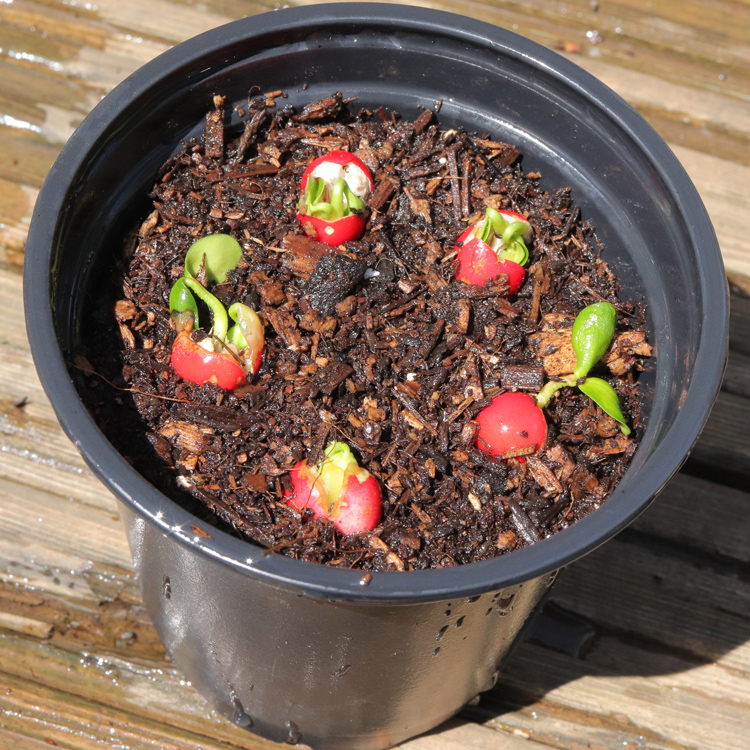I have posted under the Six on Saturday meme for three years now, seeking out half a dozen items of note, usually on a Friday, to include in my contribution. The one constant throughout is that later on Saturday I will find something more interesting than anything I included. A flower will have opened, a rare seed germinated, a long lost plant reappeared or I will notice viviparous seed germination on a Skimmia.
Vivipary is when seeds germinate while still attached to the parent plant. It’s not uncommon and is often a consequence of wet weather hampering the shedding of seeds and providing instead the conditions for them to germinate. I saw it last year on Teasel, the flower head, instead of dropping its seeds or providing food for finches, had turned green as most of the seeds germinated in the seed head.
The Skimmia is S. japonica ‘Bowles Dwarf Female’. It produced a heavy crop of fruit last autumn and went in a six on 12 October. The fruit persisted right through the winter and was still mostly there when the bush made a half hearted attempt at starting into growth this spring. Some of it is still there now. The fruits seemingly held no appeal for the blackbirds we’ve had several of all winter, nor have they just fallen off. Instead, the seeds inside have started to germinate, splitting the fruits, which are still firmly attached to the plant.
I’m sure you know by now where this is leading and you’d be right. I picked off the berries and set about teasing out the little plantlets.

The seedlings were firmly rooted into the fibrous lining of the fruit so most got planted with a bit of the fruit attached. I put 20 into one of my usual cell trays. Just for good measure, I pushed a few into the surface of a pot of compost without detaching them from the fruit at all.


Skimmias are mostly hermaphrodite, with separate male and female plants, and few are self fertile, so it is reasonable to assume that this plant has been pollinated by a nearby male. In our garden there is only one, a bush of the widely grown ‘Rubella’, which, as ornamental as it may be, doesn’t produce much viable pollen. There may be a more virile male in a neighbour’s garden but basically I don’t know for certain who’s the daddy.
Seed is given as a method of propagation in my Toogood prop book, with no mention of the progeny not coming true. It will be a while before I know what I’ve got. Sexing them before they flower is impossible. Will the males all look like ‘Rubella’ and the females like ‘Bowles Dwarf Female’ or will there be dwarf males and ‘Rubella’ sized females as well? It even crossed my mind that pollination and fertilisation were separate processes and that if it were pollination that triggered fruit formation rather than pollination, the seeds could be apomictic and the progeny clones of their parent.
I wondered if it might be a natural process, giving the seedling a head start when it eventually fell to the ground, but I have never had self sown seedlings of it and the only two fruits I could find that had detached themselves had been munched by the mighty molluscs, at least the emerging seedlings had been.
It didn’t work out for the teasel either. In the autumn there was a carpet of seedlings, thousands of them. Now I can only find three.



I’ve seen this germination on teasel but not on anything else. Very interesting.
LikeLiked by 1 person
Plants are so fascinating. I had the same last autumn with Echinacea seed heads – it was very wet. I pricked out a lot of them and kept them in the glasshouse. Gradually, many of them faded away and by spring I had eight left but as the temperature went up five of them collapsed. They had plenty of leaves but didn’t seem to have any amount of root under them. The remaining three are doing better, albeit slowly.
LikeLike
I hate it when things fade away with no obvious reason. You don’t know what you’re doing wrong and what to do instead.
LikeLike
Read this with interest. Not heard the term before, and found so much of interest here. One for the gardening club Christmas Quiz I think. Found some of the seed heads on the Nigella did this…that was my main job yesterday, grubbing up all the plants that I ought not to have allowed to grow on. Thank you for posting this Jim.
LikeLiked by 1 person
This is less common in arid climates (for the same reason it is more common after wet weather.). Fruits do not stay intact as long.
LikeLiked by 1 person
Fascinating stuff! Now the big question is where are you going to plant these if they all survive? 🙄
LikeLike
Yes, I want to know what has come from the unplanned pregnancy, which means raising the babies to adulthood. I’m not sure I’m ready for parenthood.
LikeLiked by 1 person
That was so interesting, i’ve not heard of this but I must admit I have seen it at sometime in the past and probably did put it down to wet weather. Thanks for all your interesting articles. And I agree often on the Saturday or Sunday once I’ve done my blog for Six on Saturday, there appears in the garden something that would probably have been far more interesting oh well that’s the way the cookie crumbles.
LikeLiked by 1 person
Finding something on sunday is especially vexing when you’ve struggled to find six for Saturday, and happens too often.
LikeLike
Thanks for sharing these ( stunning !) pictures and this vivipary notion of which I didn’t know the expression
LikeLiked by 1 person